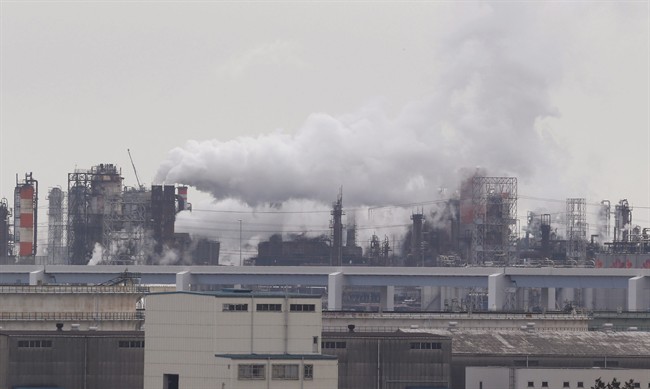TOKYO – Japan has drastically scaled back its target for reducing greenhouse gas emissions, possibly complicating efforts to forge a global climate change pact.

The new target approved by the Cabinet on Friday calls for reducing emissions by 3.8 per cent from their 2005 level by 2020. The revision was necessary because the earlier goal of a 25 per cent reduction from the 1990 level was unrealistic, the chief government spokesman, Yoshihide Suga, told reporters in Tokyo.
He called that target “completely baseless.”
Read more:UN climate talks open in Warsaw
The new target represents a 3 per cent increase over 1990 emissions. Given Japan’s status as the world’s third largest economy and fifth largest source of greenhouse gas emissions, the decision to back away from the more ambitious target could be a significant setback for efforts to reach a new agreement at world climate talks now underway in Warsaw, Poland.
Under the 1997 Kyoto Protocol, Japan pledged to cut greenhouse gas emissions by 6 per cent to 1.186 billion tons a year on average over the five years to March 2013. It has since opted out of the agreement, though came close to meeting that goal before the 2011 accident at the Fukushima Dai-Ichi nuclear power plant prompted shut-downs of all nuclear plants for safety checks.
The resulting shift back toward reliance on coal, oil and gas for power, and use of diesel generators, has hindered further progress.
Emissions in the fiscal year that ended in March were up 2.8 per cent from the year before, and at 1.207 billion tons, the second highest after a record 1.218 billion tons in fiscal 2007.
The new goal announced Friday doesn’t take into account possible emissions reductions if Japan restarts some of its nuclear plants, as the government is hoping to do. So it will be revised before the next climate pact is due to be set two years from now, said Masami Tamura, director of the Foreign Ministry’s Climate Change Division.
“This target will be reviewed in the future and we hope we will come up with a new and good one,” he said.
Environment Minister Nobuteru Ishihara plans to explain Japan’s stance and seek understanding from other participants at the talks next week. Tokyo also is planning to provide $16 billion in aid for emissions reductions in developing countries and to commit $110 billion to research on energy and the environment.
Japan is among many Asian nations experiencing extreme weather that could be linked to climate change, a concern conveyed in an emotional appeal to “stop this madness” by Yeb Sano, envoy to the 190-nation Warsaw talks from the Philippines, where thousands are dead and missing from super-typhoon Haiyan.
In Warsaw, the initial reaction to Japan’s announcement was consternation even though there is wide understanding of Japan’s energy challenges after the 2011 tsunami.
“I don’t have any words to describe my dismay,” China’s official Xinhua News Agency cited Su Wei, deputy chief of the Chinese delegation to the climate talks, as telling reporters in Warsaw.
In Japan, the powerful Federation of Economic Organizations, or Keidanren, has issued a counterproposal for cutting emissions.
Ishihara, the environment minister, has to have something to show other leaders in Warsaw, said Koh Nakajima, a Keidanren official involved in the talks. But without knowing if nuclear plants will resume operations, “It’s not very sensible of Japan to say something just for the sake of saying something,” he said.
Over the long term, both the government and Keidanren say they aim to halve Japan’s greenhouse gas emissions by 2050 through use of best available technologies and holding industries accountable for meeting their own targets.
Compared with 1990, Japan has reduced emissions per unit of economic output by 13 per cent, according to Keidanren’s calculations.
Japanese businesses are acutely aware of energy conservation, given the high costs for power, especially after the Fukushima accident.
In a recent interview, the president of electronic components maker Murata Manufacturing, spoke of taking light bulbs out of ceiling sockets to conserve costs.
“We set air conditioners to 28 (degrees Celsius, 82 F) and many other ‘peanut’ savings, we make everywhere,” said Tsuneo Murata. “We’ve been doing many things for the sake of energy conservation.”
Before the Fukushima disaster, Japan’s carbon emissions were on a par with European industrial nations such as France, Germany and Britain.
They will hit 1.227 billion tons this year, the government-affiliated Institute of Energy Economics Japan estimates, up nearly 16 per cent from 1990.



Comments